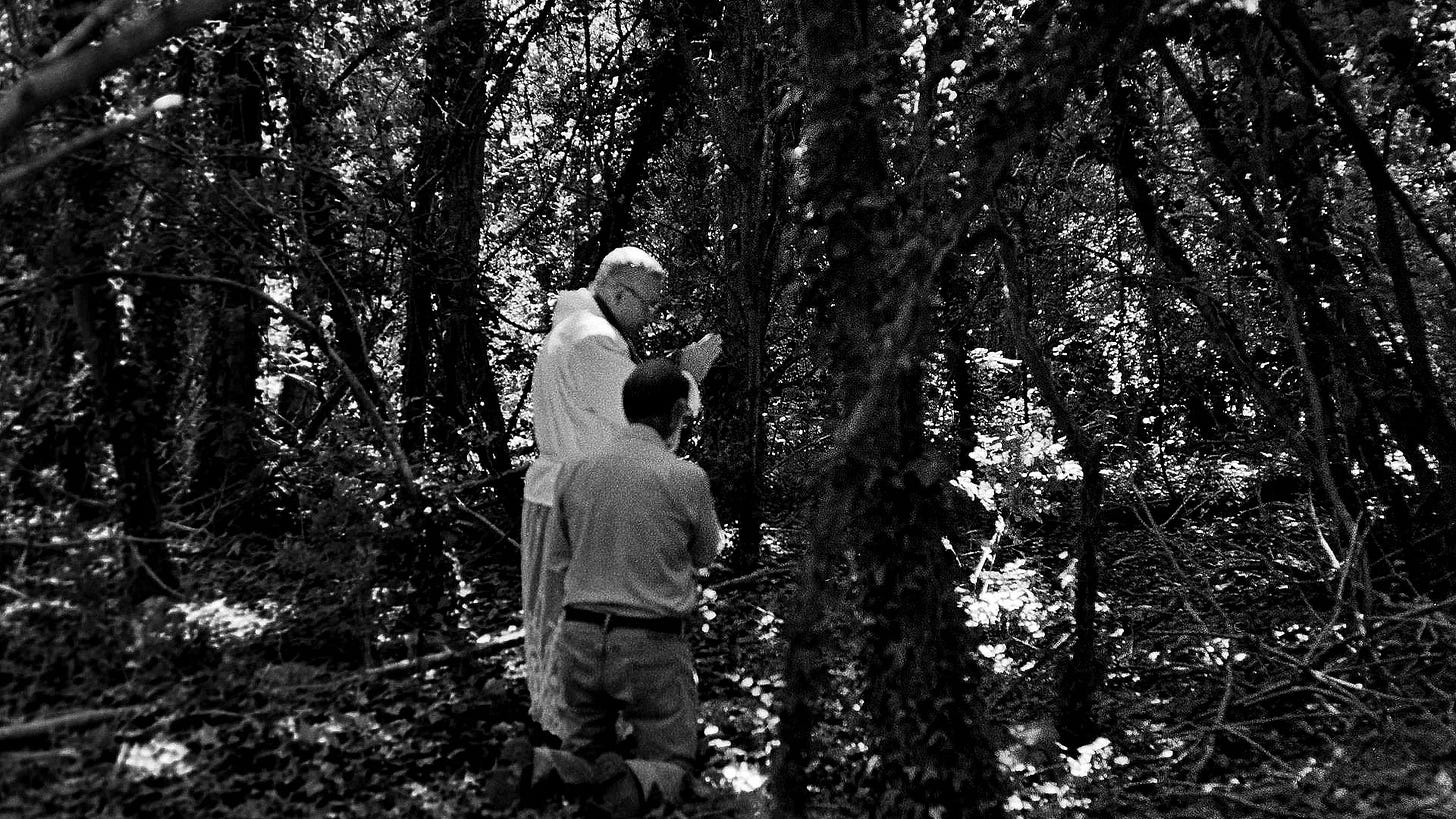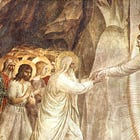Easter's lasting gift: The power to forgive sin
Before Easter Sunday was finished, Christ gave his Apostles the power to forgive sins—a power greater than that of the angels.

Before Easter Sunday was finished, Christ gave his Apostles the power to forgive sins—a power greater than that of the angels.
Editor’s Notes
In this Part, Fr. Coleridge tells us…
How the risen Christ solemnly instituted the Sacrament of Penance through his breath and words.
That the power to forgive sins was reserved until the Cross, Resurrection, and Church were complete.
Why the gift of confession is the supreme mercy conferred before Easter Day ended.
He shows us that the remission of sins is no human invention, but a divine act entrusted to the Church.
Easter Day
The Passage of Our Lord to the Father—Chapter XIV
St. Matt. xxviii. 2-15; St. Mark xvi. 2-13; St. Luke xxiv. 1-43; St. John xx. 1-29.
Story of the Gospels, § 173-177
Burns and Oates, London, 1892
The great boon early anticipated
From the early beginnings of His Ministry among men, the remission of sins had been announced as the great boon of the Gospel, in the Canticle of Zachary and in the words of his blessed son, who had been the first to speak of our Blessed Lord, under the name of the Lamb of God Who taketh away the sin of the world.
And when our Lord began His active work among men, it soon became clear that He took to Himself the power to forgive sins, which had never been exercised by priest or prophet before Him. It was made a charge against Him which He did not deny, and His claim to which power He vindicated by miracle, as when He told the paralytic man to take up his bed and walk, as a proof that the Son of Man had power on earth to forgive sins.
But up to this time there had been no word of which we are told that had passed His blessed lips, in which a clear promise had been made of the imparting of this Divine power to the Apostles and ministers of the Gospel, though we need not doubt that it had been promised, either plainly or covertly, to the Church, one of whose chief glories and privileges it was to become.
We can hardly be wrong in thinking that the Apostles must have received full instructions on the great boon which was now at last to be placed in their hands, for the endless benefit of the human race. It is not wonderful that the actions of our Saviour in conferring it were marked by singular solemnity. We must call to mind that the Sacrifice of the Cross had now been fully completed, the Resurrection accomplished, the Church organized, the Apostolic ministry conferred and declared, and the body in which it was placed assembled all therefore was ready for the collation of the great boon, which was to apply to thousands of souls the redeeming efficacy of the Precious Blood which had been shed on the Cross.
As we know, the ministry entrusted to priests in regard of this blessed Sacrament would require much special instruction, which may have been made of inconceivable value to the Church either then or on some other occasion.
Words of our Lord
The words used by our Blessed Lord on the occasion of which we speak, imply the full authority and amplitude of the commission which they convey. It is an authority no less than that in consequence of which He had Himself come into the world, and the words show that the object and the authority. and infallible efficacy of the mission is the same in both cases. The object is the salvation of the world, to be produced without failing or disappointment, as far as the original intention of God was concerned.
In carrying out the plan of the Father, our Lord was to suffer and seem to fail, but only as far as it was the will of God that even the salvation offered to men was not to be forced on any against their own will. For it was still the good-will of God, for His own glory, that the will of man should be left in its freedom, that God might have the glory which He reaps from the willing service by which above all things He delights to be served, and which issues in immense joy to Him and also to those who labour for Him.
Our Lord breathing on them
St. John then tells us that our Lord breathed on them, and said to them, ‘Receive ye the Holy Ghost: whose sins you shall forgive, they are forgiven them, and whose sins you shall retain, they are retained.’ The breathing of our Lord on the Apostles was a solemn sign and ceremony, signifying the truth that He in union with the Father was the author of the Holy Ghost, by Whom the remission of sins is accomplished, as the gifts and graces of the same Holy Spirit were afterwards signified by the fiery tongues and mighty rushing wind which were seen and felt on the Day of Pentecost.
The Holy Ghost, now given by our Lord, proceeded from His Divinity, as the breath proceeded from His Body. One of the Fathers tells us that when in the creation of man, God had breathed into him the breath of life, he had also been created in grace, and that our Lord now signified that the life of grace, which man had lost by his fall, a loss which was amply repaired to man by the gift of the Holy Ghost, now signified by our Lord’s action in this breathing. The Holy Ghost is said to be given to men when His gifts and graces are imparted to them, and one of these is the power of remitting sins, which was never given to men before our Lord.
This power of remitting sins is now given to the Apostles, and the gift is conveyed in the words which tell them to receive the Holy Ghost, as it were the author and the perfect possessor of all the various gifts and powers which belong to Him, especially as God Who can alone forgive sins, which power is nothing short of Divine, for neither men nor angels can receive or exercise it but by delegation and derivation.
The twofold clauses
The twofold clause in which the power here delegated is worded by our Blessed Lord, is necessary in order to express the judicial character of the sentence which is to be pronounced by the Apostles in their capacity of the recipients of this power, and the fulness and decisiveness of their judgment.
If it is asked, where in the words of our Lord is to be found the power which priests exercise of hearing and knowing the sins on which they have to decide, it may be answered that it is conferred in the words already quoted, which would be nugatory and even absurd if the power were not conveyed, and that it might have been altogether inconsistent with the gravity and dignity of our Lord if special words to this effect had been subjoined by Him. The words of our Lord are concise, but they are absolutely sufficient and adequate for their purpose, and to add more would have been inconvenient.
To say that a great deal might have been added, is only to say that the Sacrament of Penance is a vast subject, under which a great many rules and principles were quite sure in course of time to become needful, many of them requiring careful balancing and arrangement, and that the time was not come, in the days even of the Apostles, for the complete elaboration of the vast practical system which has sprung from the commission here given to the Apostles by our Lord. In fact, it would be difficult to name any words of the Incarnate Son of God which have had more influence on the lives of men than these, and which live on more fruitfully in the Church for the salvation of mankind.
The close of Easter Day
This then is the great institution of the Sacrament of Penance, reserved by our Lord, though previously promised, until after the Sacrifice of the Cross had been completed, and the Resurrection accomplished, the Church organized, and the prerogatives of the Apostolic ministry declared, and now solemnly conferred on the body for the benefit of all to the end of the world.
This is an appropriate finish and crown to the first Easter Day, the work which our Saviour selected as the great gift to the Church before the first night fell upon the infant Church. Like all great acts of our Lord, it was carried out in a few simple words, but with great solemnity of manner, in accordance with the immense importance of the subject and the universality of the power now bestowed. There are no sins that are left out in this universality, nor any sin of any person which is excluded; the remission is as universal as the merits of the Saviour by Whose Blood they are to be cancelled.
St. John lastly passes to a part of the history of this wonderful Easter Day, of which he is the only narrator—what is commonly called the incredulity of St. Thomas.
This is the subject of the next part.
Subscribe now to never miss an article:
Easter Day
What the risen Christ did when he met all the Apostles together
Easter’s lasting gift: Confession and the power of absolution
Read Next:
Here’s why you should subscribe to The Father Coleridge Reader and share with others:
Fr Coleridge provides solid explanations of the entirety of the Gospel
His work is full of doctrine and piety, and is highly credible
He gives a clear trajectory of the life of Christ, its drama and all its stages—increasing our appreciation and admiration for the God-Man.
If more Catholics knew about works like Coleridge’s, then other works based on sentimentality and dubious private revelations would be much less attractive.
But sourcing and curating the texts, cleaning up scans, and editing them for online reading is a labour of love, and takes a lot of time.
Will you lend us a hand and hit subscribe?
Follow our projects on Twitter, YouTube and Telegram:




